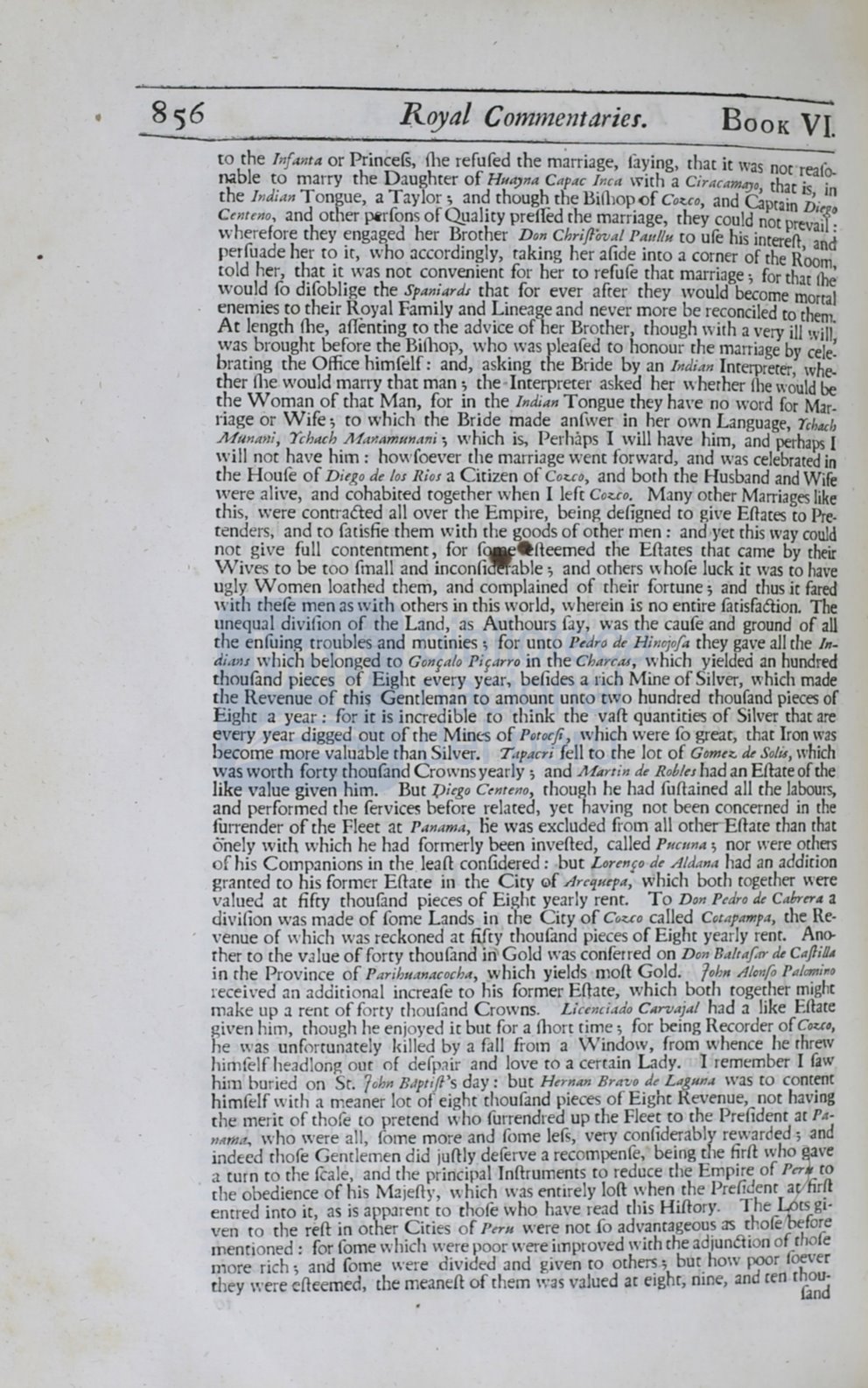

•
•
Royal
C
ommentarie1.
BooK
VI.
to the
Infanta
or PrinceCS, <he refufed the marriage, faying, that
it
was nor
G
nable
t?
marry the Daughter
of
Hnayna
Capac
Inca
with
a
Ciracama;o,
thar
~ea ~
the
Jndum
Tongue, a Taylor; and though the Bi(hopof
Co~co
and
Capra·
~ ·
10
Centeno,
and other
~rfons
of Qµality preffed the marriage, they could
not~~ '1~
wherefore they engaged her Brother
Don Chriftoval Paullu
to ufe
his
interefievai
d
perfuade her
tC?
ir,
who
accordin~ly,
taking her afide into
a
corner
of
the
R'o~~
told her, that it
'"as
not convement for her to refufe that marriage· for that
(h'
would
fo
difoblige the
Spaniartb
rhat for ever after they would
b~ome
mo
tal
enemies to their
Roy~l
Family and
~ineage
and never more be reconciled to
th~m.
At
length <he, affentmg
t?
the advice of her Brother, though with a very
ill
wiJl
1
was. brought before
~he
B1fhop, who. was pleafe_d to honour the marriage
by
cele–
brating the Office h1mfelf: and, askmg the Bnde by an
Indian
Inrerprerer,
whe~
ther {he would marry that man ; the Interpreter asked her whether
fhe
would
be
t~e
W
oma~
of that
~an,
for in. the
Indian
Tongue they ha\ e no word
for
Mar–
nage
o~
Wife;
to which
t~e Bn~e
'!lade
a~f
wer in. her own Language,
Ychac/,
Mana~11,
T'chach Manamunam;
which 1s, Perhaps
I will
have
him
and
perhaps I
will not have him : bowfoever the marriage went forward, and
":as
celebraced
in
the Houfe of
Diego de los Rio1
a
Citizen of
Couo,
and boch the Husband and
\¥ife
'"ere alive, and cohabited together
when I
left
Co~co.
Many other
Marriages like
this, were concraeted all over the Empire, being defigned to give Efiates to
Pre–
tenders, and to facisfie them with the goods of other men: and yec this way could
not give
full
contentment,
for
f<
ll:eemed the Efiares
char came
by
their
Wives
to
be too fmall and inconfi
·able; and others "'hofe luck it
was
to
have
ugly Women loathed them, and complained of their fortune; and thus
it
fared
with thefe men as
with
others in this world, wherein
is
no entire fatisfaCtion. The
unequal divilion of the Land, as Authours fay, was the caufe and ground of
all
the enfoing troubles and mutinies; for unto
Pedro de Hinojofa
they gave
all
the
ln–
ditm1
which belonged
to
Gonfalo Pifarro
in the
Charca1,
which yielded
an hundred
thoufand pieces of Eight every year, befides a rich Mine
of
Silver, which
made
the Revenue of this Gentleman to amount unto two hundred thoufand
pieces
of
Eight
a
year
:
for
it
is
incredible
to
think the vafl: quantities of Silver that
are
every year digged out of the Mines of
Potocji,
which were
fo
great, that Iron was
become more valaable than Silver.
T apacri
fell to
the
Jor of
Gome~
de
Solu,
which
was
worth
forty
thoufand Crowns yearly ; and
Martin
de
Ro/;/e.s
l1ad an
Efiate of the
like value given him. But
:l)iego Centeno,
rhough he had fufiained all the labours,
and performed the fervices before related, yet having not been concerned
in the
furrender of the Fleet
at
Panama,
ne
was
excluded from
all
otherEfiate than
chat
onely
with
which he had formerly been invefl:ed, called
Pucuna;
nor
were orhers
of
his Companions in the.
leall:
conGdered: but
Lorenfo
de
Aldana
had
an
addition
granted
to
his former Efrate in
the
City
G>f
Arequepa,
which both together
were
valued at fifty thoufand pieces of Eight yearly rent. To
Don Pedro
de
Cabrera
a
divifion was made of fome Lands in the City of
Couo
called
Cotapampa,
the Re-
, \ enue of
n
hich was reckoned at fifcy thoufand pieces of
Eight
yearly rent.
Ancr
rher
to
the value of forty thoufand in Gold
~as
conferred on
Don
Balrafar
de
CafliD11
in
che Provjnce of
Parihuanacocha,
which yields mofl: Gold.
rohn
Alon(o Palomino
received
an
additi nal increafe to his former Efiate, which both cogecher might
make up
J
rent of forty thoufand Crowns.
Licenciado C11rvajal
had a like Ellate
gi\
en him, though he enjoyed it but for a fhort time; for being Recorder of
Couo,
he '''as unfortunate y killed by a fall from a Window, from whence he rhrew
himfelf head ong out of def
pair
and love to a certain Lady.
I remember I
faw
him boried on St.
{ohn Bdptifl-'s
day : but
Hernan Bravo
de
Lagnna
\\as to
cont~t
himfelf' irh a meaner lot of eight thoufand pieces of Eight Revenue, not havmg
the merit of chore
to
pretend
who furrendred up the Fleet to the Prefident ar
Pa–
m1m
who were all
fome more and
Come
le~,
very confiderab)y rewarded; and
indeed thofe
Gentl~men
did jufl:ly deferve a recompenfe, being the
~rl1:
who ave
turn
to
the fcale> and the principal Infrruments
to
reduce the Empire of
Per
co
rhe obedience of hi Majelt)
\~1 hich
was entirely loO: when the Prefident a
fir~
enrred into it, as is app3rem to chofe who ha e read this Hillery.
The
gi–
ven to the refr in other Cities of
Peru
were not
fo
advanrageoas as thole efore
mentioned : for fome \'\·hich ""'ere poor were improved wich the adjunttion of chofe
more rich· and fome were di ided and given
to
others; but hm poor foever
1ey , ·ere
~fieemed,
the meanefi
of
them
·as aJued at eight, nine, and cen
cio:d














